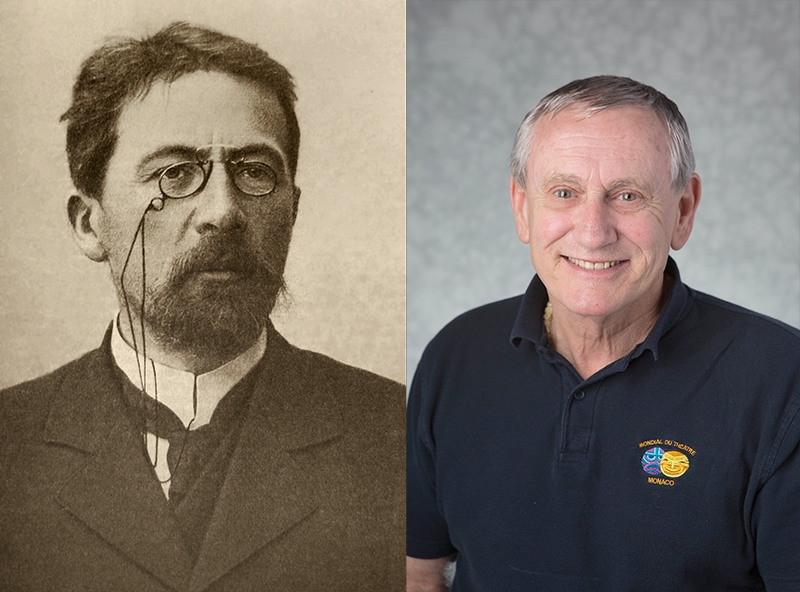Russian playwright Anton Chekhov and his life will be recreated onstage this month in a one-man drama, Anton, Himself: First and Last.
Roger Ellis, professor of theater at Grand Valley State University, is self-directing and performing solo in the play as part of a three-day premiere.
Chekhov is considered to be one of the most popular short fiction writers in the world, and only lived to be 44 years old.
“He earned a lot of fame even though he had a short career,” Ellis said. “But it was important not just because of the way he captured life, but also because he lived at a time where the theater was breaking out of older conventions of very stiff formality in the 19th century, (which) contributed to what we now call realism and naturalism.”
In his short life, Chekhov influenced the way writers and actors function today. Working closely with Konstantin Stanislavski, an actor and theater teacher, they were part of the renewal of theater and acting at the end of the 19th and beginning of the 20th centuries.
Ellis has performed this show four times in Grand Rapids, but only the first act. This time, the original writer — Karen Sunde of New York City — was commissioned by GVSU to write an act two, which will focus on the end of Chekhov’s life.
“I’m hoping that now that it’s a full-length piece, it will provide more perspective and be more interesting for people,” Ellis said.
Sunde said she has “lots of anticipation” in seeing her play performed this month. This will be the first time anyone will see the second act of the show.
“It will be all very new,” Sunde said. “It’s just a great pleasure because you know that someone who’s cared about this work so much for so long is going to have a lot to bring to it. And I’ve enjoyed very much working with him on it.”
Before Sunde was a playwright, she was an actress at the CSC Repertory, an off-broadway theater house in NYC where the same group of actors performed all the shows, all season. Inspired by this type of theater that is more common outside of the U.S., Sunde wrote a play about the making of a theater company in To Moscow. A Louisville theater company appreciated that show so much, they requested she write another play, this time a one-man show. That’s when she started writing Anton, Himself: First and Last.
“Chekhov was interested in life and people and that was his great depth, like a Shakespeare,” Sunde said. “He cared and he observed them very well. So that kind of thing can translate immediately to anybody.”
By now, Ellis said he’s come to know Chekhov as a character he can portray.
“The role does require a lot of research,” Ellis said. “One area is his growing illness. … Even at the start of his career as a playwright, he was having the symptoms of Leukemia. Of course, towards the end of his life he was really suffering from it, so there’s a lot of that physical debilitation that I’ve had to capture.”
Ellis describes Chekhov as moody and creative, which he’s taken from letters, plays and accounts from those who knew him.
“He could be very upset if he felt the actors were not following his stage directions, artistically giving him the effects he wanted,” Ellis said. “The next moment he’d be very warm, friendly. He had that kind of personality that was exciting, and yet took himself very seriously, but he had a sense of humor.”
Ellis said Chekhov’s personality alone makes the monodrama more interesting.
“You never quite knew where he was going with a story,” Ellis said. “The plots were never predictable, and always some new thoughts would occur to him. That’s one of the things that makes this play so interesting. Because it sounds like, oh, you’ve got one actor, he’s always talking — he’s still the same character, but the character of Chekhov is continually changing, his moods are changing, (and the) subject’s changing.”
Additionally, because there are no other characters, Chekhov will also speak to the audience, making the play more interactive.
“It’s a unique connection between the performer, actor and the spectator,” Ellis said.
Chekhov was political in some of his ideas, and was against some of the troubling beliefs spreading in Russia at the time, especially anti-Semitism. His father was a peasant, so Chekhov commonly rooted for the underdog. When he came into money from his work, he even bought a country estate and built hospitals and schools.
“A lot of this play mirrors those changes in Russian society,” Ellis said. “The new class is rising up and the old, wealthy, decadent class is fading away. It’s very much like what is happening today.”
Anton, Himself:First and Last
Grand Valley State University Theater
Haas Center for Performing Arts
Jan. 19-21, adults $12, students $6
startickets.com, (616) 331-2300





